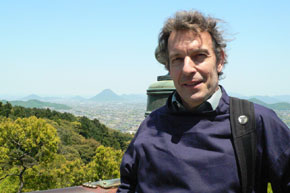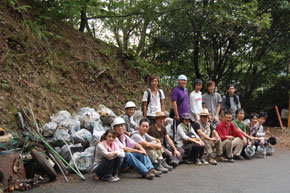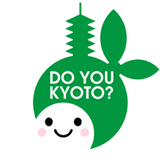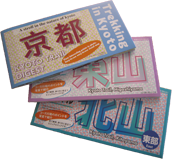Arts & Performances
Kyoto is a birth place of traditional arts, crafts and performances of Japan, and has been maintaining its tradition with the coming of the new age. Here GTK'd like to introduce the monthly art highlights, museums, creators etc.
Art Feature Vol.2
Mr. Stephen Gill, English haiku poet
Stephen Gill, a Kyoto resident for many years, has long been expressing seasonal changes and moments from daily life in his haiku works.
Haiku, the shortest of poems (with just 17 Japanese letters, or ’moji’), was born in Japan in the 17th century. However, I wonder how many Japanese have actually written a haiku or know very much about well-known poets such as Matsuo Basho or Kobayashi Issa?


Q & A
- First, what fascinated you about haiku?
- The poems recreate vividly moments experienced by another person in such a way as to allow us to re-experience them. This is because we have to use our imagination to fill in the details.
- What is the difference between Japanese haiku and English haiku?
- In spirit, they are the same. English haiku generally are free-form, meaning that most people do not count ‘syllables’ (which some say are the equivalent of Japanese ‘moji’). We try to write in under 17 syllables, but the pattern is not strict about short-long-short lines. It is more about the resonance or aftertaste of the poem and less about its form. We sometimes use seasonal reference, but there is no rule in English haiku that says we must refer to a season. This is because we do not have the lists of clear seasonal references (kigo, saijiki), which have evolved over hundreds of years in Japan.
- Haiku has been popular all over the world. What do you think is the reason for this?
- This is an age of information deluge (jouhou kouzui). The silence and the brevity of haiku appeals.
- If the GTK readers want to start learning English haiku, are there any good haiku classes or text books you recommend?
- Hibikiai Forum English Haiku Poems Class started on the Doshisha Imadegawa campus more than twelve years ago. Anyone can attend. We have an autumn semester (2nd Thursdays, 6:00-7:30, Oct.-Jan.). The best book for the beginner is probably William Higginson’s ‘The Haiku Handbook’, but anthologies of either Japanese haiku translated into English, or of English haiku themselves, are available, too. For example, the bilingual ’One Hundred Poets on Mt. Ogura, One Poem Each’ published jointly by PTO and the Hailstone Haiku Circle and available in Junkudo Bookshop (BAL Building, Kawaramachi) or in Dakushikan Bookshop at the Kyoto Museum (Kyoto Bunka Hakubutsukan). Familiarize yourself by reading examples, but remember to read each poem more than once!
- You are not only a haiku poet but also one of the founders of the NPO called People Together for Mt.Ogura (PTO) which is active in conservation and environmental education, including rubbish collection on Mt. Ogura (Arashiyama area). From when did you start, and what can we do if we’d like to participate?
- This NPO was formed in 2008, but its Chairman, Okiharu Maeda, and I had been working with another NPO clearing rubbish illegally tipped on Mt. Ogura since 2004. I started the campaign in March 2004 by holding an art/poetry exhibition in a Kawaramachi Street gallery here in Kyoto, in which I displayed, along with artworks and poems, rubbish brought from the mountain itself! You can check our workday schedule on the ptogura website (see below) or come along to our autumn festival hike on Nov. 21 (Sun.). Meet Saga-Arashiyama Station at 10am.
- Lastly, would you mind introducing one of your haiku poems to the GTK readers, please?
- This one has seasonal reference, but it’s perhaps a syllable too long. Anyway, it does have an environmental message in it, I hope.
Heat of the day –
A pine-clad cliff
Down which a washing machine
Has tumbled.
The antique urushi ware shop, Uruwashiya is the best shop, I think. You can enjoy various kinds of urushi crafts and be surprised by the elaborate paintings with gold lacquer. You could get only one antique urushi you like at a reasonable price.
For information on ’Hibikiai Forum English Haiku Poems Class’, check website:
http://hailhaiku.wordpress.com ![]() (click Events & Seminars page)
(click Events & Seminars page)
For information on the NPO, People Together for Mt. Ogura, check their website :
http://ptogura.web.fc2.com![]() (English page available)
(English page available)
For the report of rubbish collection on Mt.Ogura, see the GTK blog :
http://www.greentour-kyoto.net/kyoto/rubbish-collection-on-mt-ogura/![]()
- Highlights of Art
- Museum Information
- Art Feature

- Art Feature Vol.3
- Busshi

- Art Feature Vol.2
- English haiku poet

- Art Feature Vol.1
- Lacquer crafts painter

![]()






